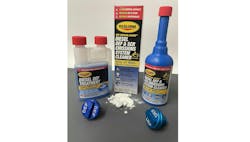Guest Blog: Remove and prevent diesel DEF crystals
It’s hard to beat the power, torque and fuel economy of a diesel engine. Plus, with proper care, they can last twice as long as gasoline powertrains. For modern diesels, proper care includes maintaining the Selective Catalytic Reduction (SCR) emissions system.
The SCR system injects Diesel Exhaust Fluid (DEF) into the hot exhaust stream and filters it through a catalyst to convert harmful tailpipe emissions into plain nitrogen and water. When it’s working properly, the vehicle owner won’t even notice the SCR system. But, under certain conditions, DEF can break down and evaporate, leaving behind white crystal deposits. As these crystals build up, they clog SCR system components and interfere with normal operation, which increases fuel consumption and reduces engine power. This can cause the vehicle to operate in “limp mode,” where it drives slowly or not at all.
The deposits are formed when the water component of urea-based DEF evaporates, leaving behind a crystallized solid urea residue. The main reasons white crystals develop are:
- Leakage: If the SCR system has any leaks, the water will evaporate, leaving behind only crystallized urea.
- Overfilling: Putting too much DEF into the tank can lead to spills, which often crystallize.
- Improper Handling: If DEF is not handled or stored properly, it may become contaminated. That can lead to crystallization. DEF should always be stored in a cool, dry, well-ventilated place away from direct sunlight.
- Poor Quality DEF: If the DEF doesn't maintain the required ratio of deionized water to urea, deposits can form.
- Contamination: Diesel fuel or other harmful chemicals accidentally entering the SCR system can cause deposits.
Diesel vehicles that are regularly driven at low speeds, with light loads, for short durations, or that make frequent stops are especially prone to developing white crystal deposits in their SCR systems.
Signs of DEF crystal contamination include:
- Warning lights
- OBD codes P20EE, P20EF, P204F, P207F, P20E8, and P218F
- Decreased fuel efficiency
- Reduced vehicle power, up to and including limp mode.
That’s the rough backstory, but what your customers want to know is how to get rid of white crystal deposits and how to prevent them from coming back. Rislone has the answer to both questions with two unique formulations that can stop crystallization before it starts.
The chemical lightning to zap the crystals comes in the form of new Rislone DEF Crystal Clean Diesel DEF & SCR Emissions System Cleaner (No. 4784) and Rislone Diesel DEF Treatment (No. 4780).
“Our new products make maintaining the SCR system as easy as taking care of any other fluid system on the vehicle,” says Clay Parks, vice president of development for Rislone. “First, clean the system of any existing crystals by installing DEF Crystal Clean in a mostly full DEF tank. Once the system is clean, your customers can keep it that way by adding Diesel DEF Treatment every time they refill the DEF tank to prevent new crystals from forming. In most cases, it’s that simple.”
Rislone DEF Crystal Clean is a proprietary blend of cleaning agents and surfactant detergents specifically designed to safely and effectively clean SCR systems in diesel vehicles of all sizes. It dissolves crystal deposits throughout the entire SCR system, including the tank, pump, heater, sender, lines, injector, decomposition tube/reactor and mixer. It also clears P20EE and related OBD codes and restores SCR function.
Rislone DEF Treatment improves DEF fluid performance to help keep the SCR system clean, prevent new crystals from forming, and improve the longevity of emissions components.
Information provided by Rislone.
